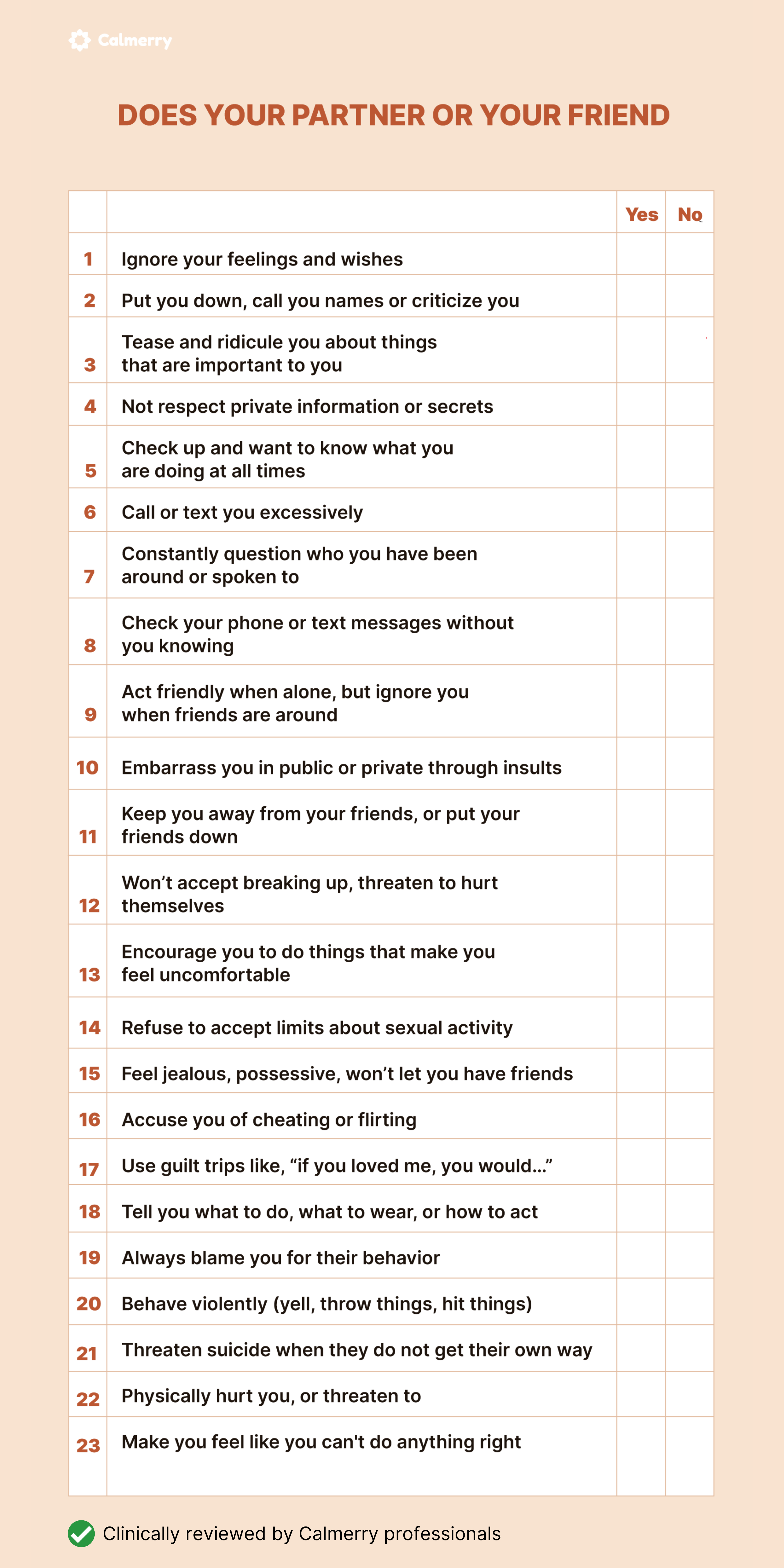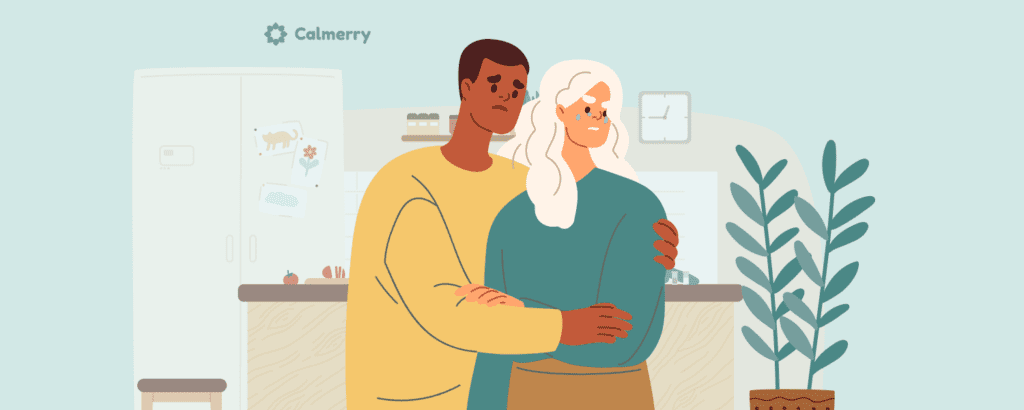Healthy vs. Unhealthy Relationships: How to Tell the Difference

In this article
Relationships are an essential part of healthy living because social connections are crucial for our mental and physical health. From acquaintances to romances, relationships can enrich our lives and make us happier. But at the same time, relationships can also cause discomfort and even be harmful.
Not all relationships are going to be perfect all the time, and we all have moments when minor disagreements will rise to the surface, causing frustration with others. That is just a part of managing our relationships with other people.
But for the most part, a good relationship makes you feel respected, secure, loved, happy, and free to be yourself. Friendly, romantic, or familial, healthy relationships benefit all the people who are a part of them because they enrich their lives.
Not all relationships are healthy, but everyone deserves to be respected in a functional and loving relationship. That’s why staying informed about the difference between healthy vs. unhealthy relationships is important. You should learn to identify when a relationship is going well and notice “red flags” that may indicate that your relationship is becoming abusive.
Relationships are a spectrum
All relationships exist on a spectrum ranging from healthy to abusive, and unhealthy relationships are somewhere in the middle. That’s because all relationships are made up of different behaviors, which can be characterized as unhealthy, healthy, or abusive.
But the same behaviors can look different for different people. For example, something that is healthy for one person may be unhealthy or abusive for another. In fact, a relationship may be a mix of healthy and unhealthy behaviors but should be considered mostly healthy.
Healthy behaviors promote equality for both partners. On the other hand, unhealthy behaviors may subtly or obviously try to exert control and power over another partner. While abusive behaviors definitely exert that control and power over someone else.
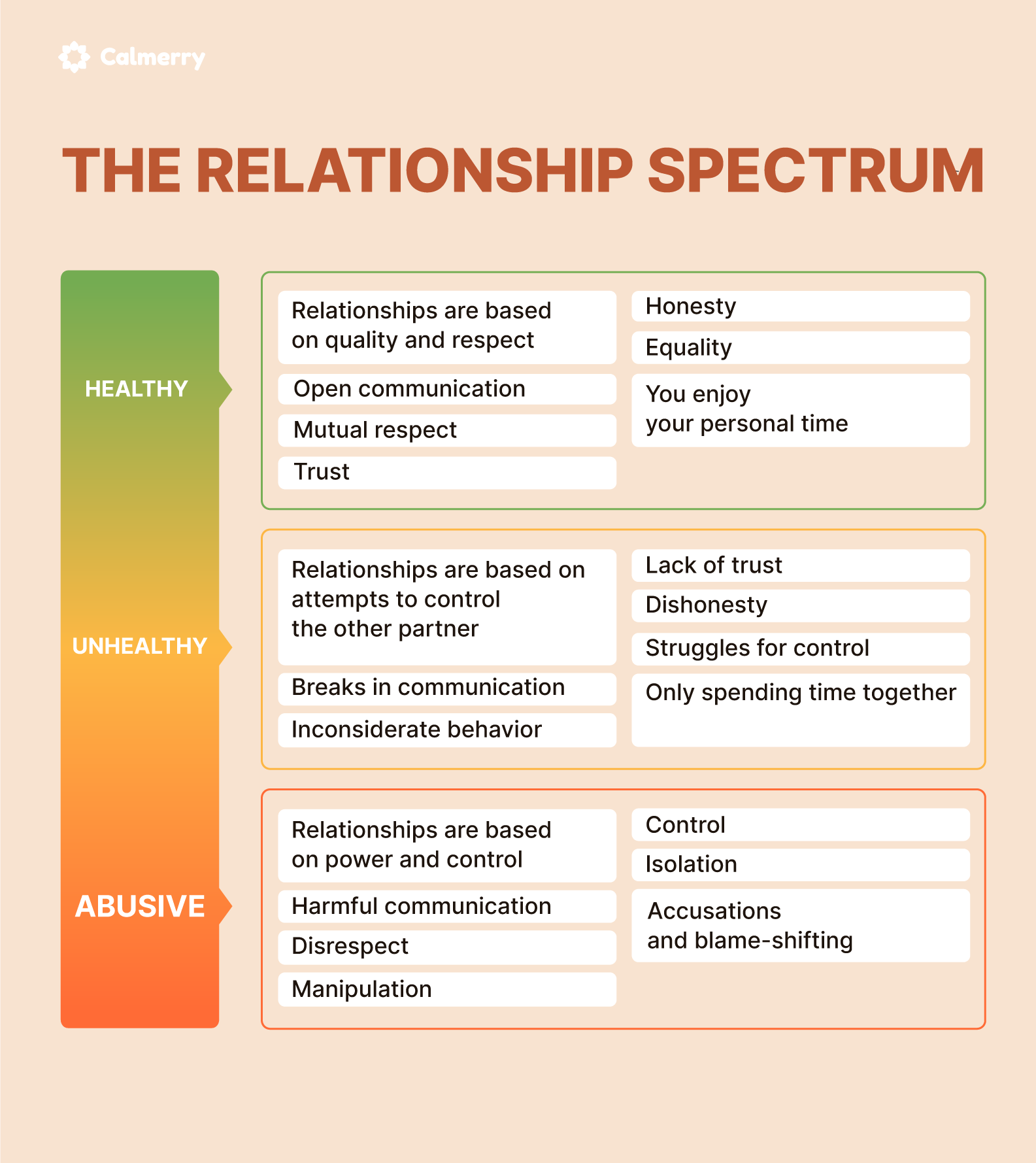
Healthy relationships are based on trust, respect, equality, and consent are the norm. While such relationships are not perfect, they are characterized by healthy behaviors. That’s why it’s possible to safely address weaknesses, strengths, and problems, and that will lead to productive change.
While it’s not always obvious to us, control and power are always at the core of both unhealthy and abusive behaviors and unhealthy and abusive relationships.
Unhealthy relationships are characterized by disrespect and distrust (in the form of defensiveness or stonewalling), and you may not feel equal to your partner. And abusive relationships involve patterns of destructive behaviors (physical, emotional, or sexual abuse), which people use to exert power or control over their partner.
What makes a healthy relationship?
First of all, you should understand that there is no such thing as a perfect relationship. All romantic relationships have a mix of both healthy and unhealthy characteristics, so they can look different.
Besides, it’s difficult to apply the same standards to every relationship because different people have different needs around affection, communication, shared values, sex, etc., and their needs may change throughout life. So your idea of a healthy relationship will be different in your 20s and in your 40s.
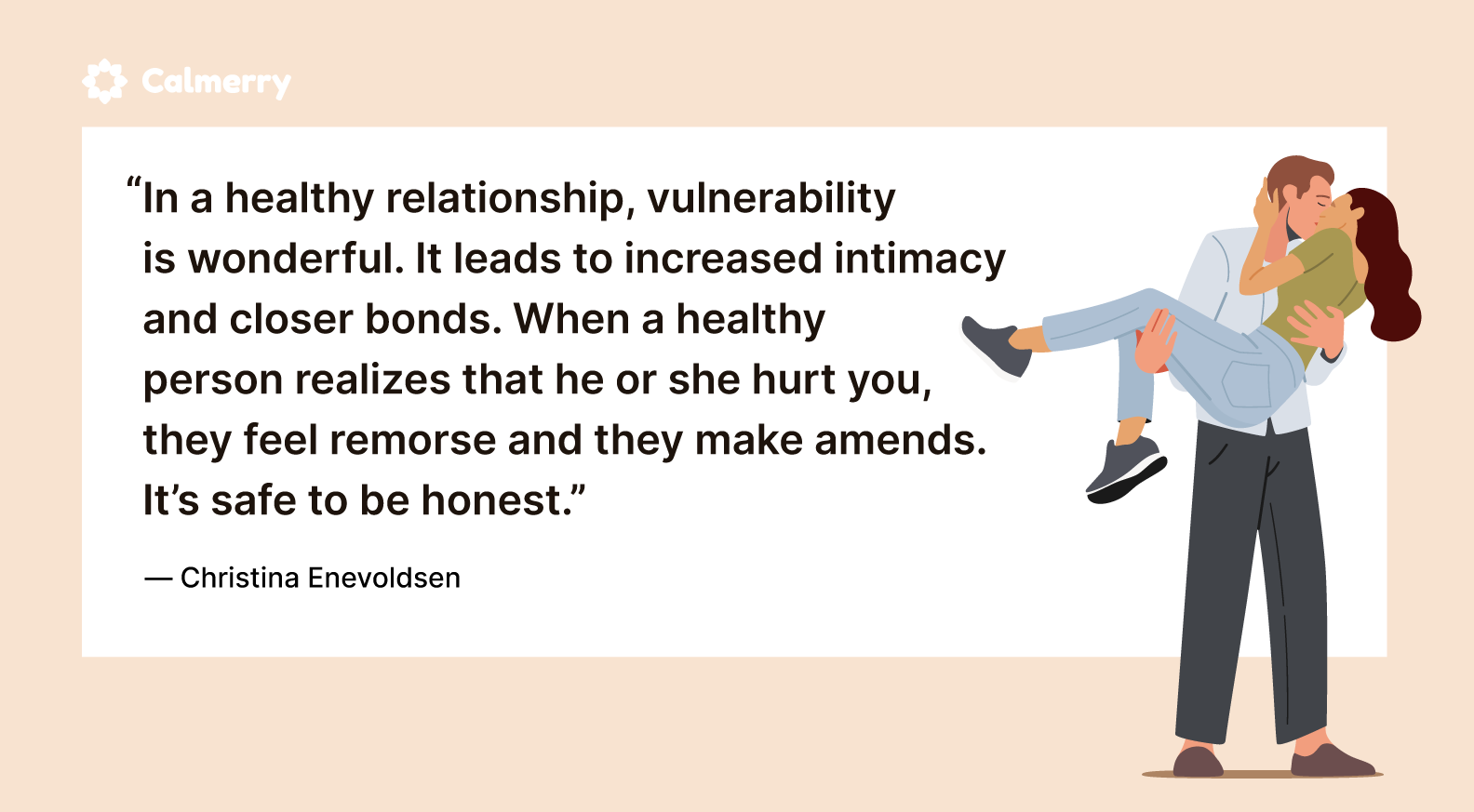
But healthy relationships have a few things in common, and knowing these basic characteristics can help keep your relationship meaningful, fulfilling, and exciting.
So, a relationship is considered healthy when two people develop a connection based on such aspects:
- Trust – you feel safe and comfortable with your partner; you can count on them and know they’ll support you.
- Mutual respect – you value each other and respect each other’s boundaries.
- Good communication – you are comfortable talking about everything that goes on in your life: successes, problems, financial concerns, work stress, failures, etc.
- Honesty – you are truthful and open with your partner and feel you can be yourself without the fear of being judged.
- Equality – you both make an equal effort in your relationship and make all important decisions together.
- Support – you support each other in good and difficult times and encourage each other to grow.
- Responsibility – both of you are responsible for your words and actions and avoid placing blame; you are able to admit when you make a mistake.
- Separate identities – neither of you compromises who you are, you both have your own identities, with freedom and space.
- Safety – you don’t worry that your partner may intentionally harm you; neither of you tries to maintain power and control over the other.
While no relationship is absolutely perfect and healthy 100% of the time, and all the things mentioned above take work, you should strive for such characteristics in all your relationships – whether they are romantic, familial, work, or friendships.
All relationships look different, and it’s normal. Still, the key aspects are open communication that allows both partners to be on the same page, knowing that they want and expect the same things in their relationship and healthy boundaries that make both partners feel comfortable and secure.
About 3/4 of couples who report effective communication and practice responsive listening feel more emotionally connected.
What are the signs of a healthy relationship?
So how can you tell if your relationship is healthy? Healthy relationships bring us positive emotions, make us feel good about ourselves, and we feel contentment, happiness, and calm. If you can say yes to most of these things, it’s very likely you are in a healthy relationship:
- You have good self-esteem and take care of yourself
- You have fun together
- You are honest with each other and trust each other
- You make decisions together and share financial burdens
- You have the option of privacy
- You have your own “love language”
- You always turn to each other for emotional support
- You feel comfortable telling your partner about your worries
- You respect each other’s personality
- You both are interested in one another’s activities, thoughts, and goals
- You resolve conflict fairly and successfully
- You’re comfortable with saying no to your partner
- You both have respect for sexual boundaries
- You maintain relationships with family and friends
- You have your own lives outside of the relationship
- You grow and develop together
People in healthy relationships have disagreements, but they see them as an opportunity for growth. There may be conflicts, but both partners always make an effort to find common ground.
What are the signs of an unhealthy relationship? (+Worksheet)
Relationships can change over time, and not each of them is 100% healthy all the time. When we experience stress, it can provoke unhealthy behaviors and coping mechanisms and lead to problems. And if you feel distressed, anxious, or unhappy around your partner, it means that your relationship is struggling.
Find this worksheet in PDF format here 👉🏼 Healthy vs. Unhealthy Relationship Checklist
A relationship is considered unhealthy when bad things outweigh good or when particular behaviors are harmful to one or both partners. So what are the warning signs of problems you should look for? Here are some possible issues, but this list is not all-inclusive.
- You feel like you have “lost yourself”
- Your partner is controlling or possessive
- You are emotionally dependent on your partner and see no sense in being able to exist without them
- You have a lack of privacy
- Your partner constantly questions and criticizes your choices and decisions
- You often feel guilty for no reason
- You feel lonely when you are together
- You argue all the time
- You neglect your own needs to put your partner first
- You don’t have common friends
- You catch your partner lying repeatedly
- Your partner is dismissive of your emotions
- You experience a lack of equality
- You avoid one another
Keep in mind that some of these problems can be temporary, and it doesn’t necessarily mean that your relationship is doomed. Everyone has arguments, and we all do things that we regret at times. If you recognize how these problems affect you, you can address them together with your partner and work together to improve those negative aspects. You can use self-help methods, for example, start your couples journal, or consult a mental health professional.
But if there are more serious problems, for example, abusive behaviors, and you feel trapped, controlled, or drained by your partner, you should consider ending your relationship because security and safety should be your primary concerns. If there is physical violence, it usually signals the beginning of a dangerous, consistent pattern. And emotional abuse (manipulation, gaslighting, isolation, contempt, or shouting) can leave invisible scars that are equally harmful to your emotional and mental well-being. There is no excuse for abuse of any kind.
When examining your relationship, you should remember that emotional abuse is often very subtle and can involve sophisticated and toxic mind games, so it’s one of the hardest forms to recognize. You should think about how interactions with your partner make you feel. If you feel anxious, depressed, worthless, misunderstood, or frustrated most of the time, your relationship may be emotionally abusive.
What are the effects of healthy and unhealthy relationships?
If relationships are healthy, people can feel safe, respected, and accepted for who they are. Besides, many research studies have revealed that satisfying relationships are associated with greater happiness, better physical and mental health, and even longer life.
This positive effect is not limited to romantic relationships. Supportive social connections with family and members of your community and close friendships can also help you feel happier and healthier.
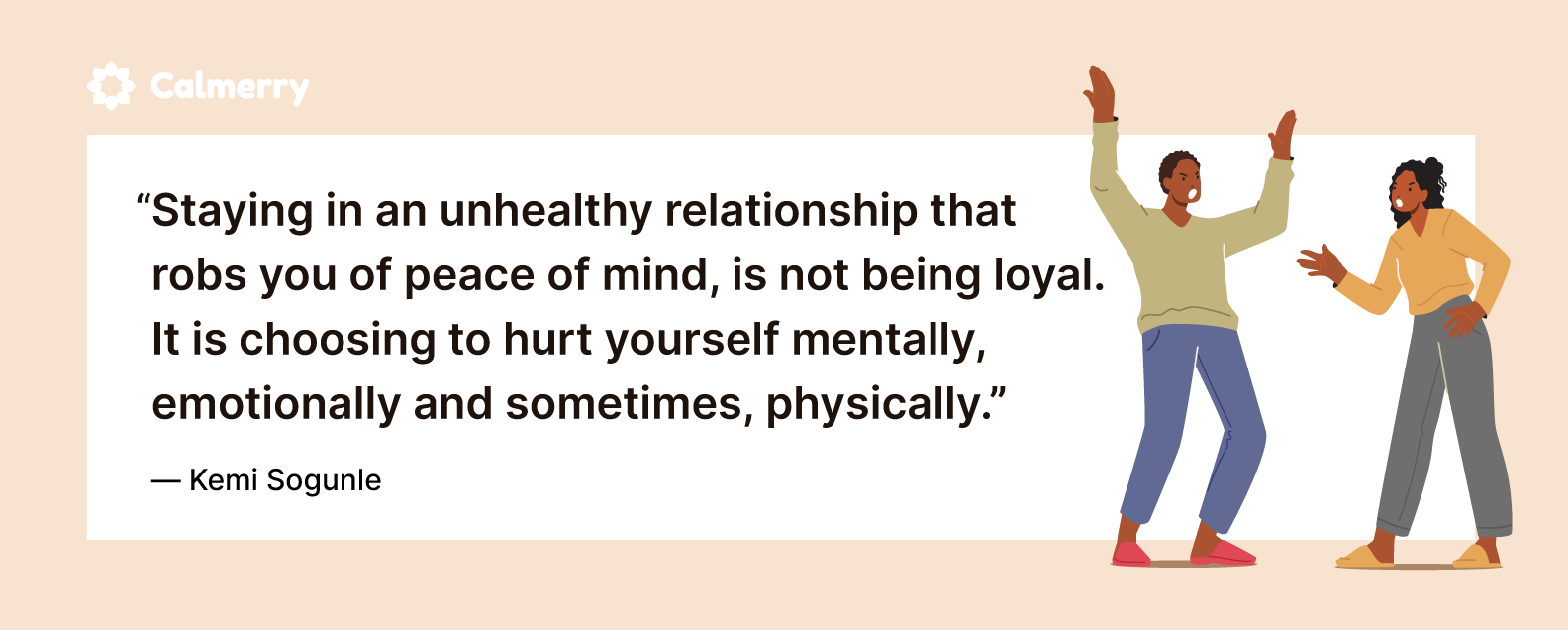
On the other hand, in unhealthy relationships, people may feel confused, anxious, uncertain, and even unsafe. If other people are disrespectful, undermine your trust, or discourage you, it can stress you out, have a negative impact on your physical and mental health, and harm your connections to other people. The longer you remain in a toxic relationship, the greater damage to your health.
You may suffer from depression or low self-esteem, which may also affect all aspects of your life. You may start doubting your own reality and your own values. Poor relationships may lead to unhealthy behaviors, for example, drinking, smoking, and drugs. And they could also lead to a change in appearance, sleep disorder, loss of appetite, and weight loss.
When to seek help
We all may do unhealthy things sometimes, and we can learn to be better partners if we recognize unhealthy signs and shift to healthy behaviors. If you start noticing unhealthy signs, don’t ignore them because they can escalate to abuse.
If your romantic relationship is affecting your mental and emotional health, you should consider individual counseling. An unhealthy relationship can be improved, but you should remember that this healing process requires work, and both partners should be prepared to do it. Repairing a toxic relationship takes time, patience, and diligence.
So if you want to stay in the relationship and make an attempt to make it work, it’s important to tell your concerns to your partner. You should think together of the necessary steps that both of you can take to improve the situation.

If you feel like you need outside help, consider talking to a therapist who is skilled in addressing relationship and interpersonal issues. An experienced mental health professional can help both of you learn to communicate better, cope with some challenging issues, and find a solution that is healthy for both partners.
But you should remember that you can’t force your partner to change their behavior if they don’t want to. So if your partner is not interested in therapy, you should focus on your own needs and well-being. And sometimes, letting go is the best thing you can do for yourself.
If you are feeling unsafe or being abused in your relationship physically, emotionally, or sexually, the best thing you can do is end it. Even if you believe that your partner loves you, it doesn’t make up for all the harm they are doing to you.
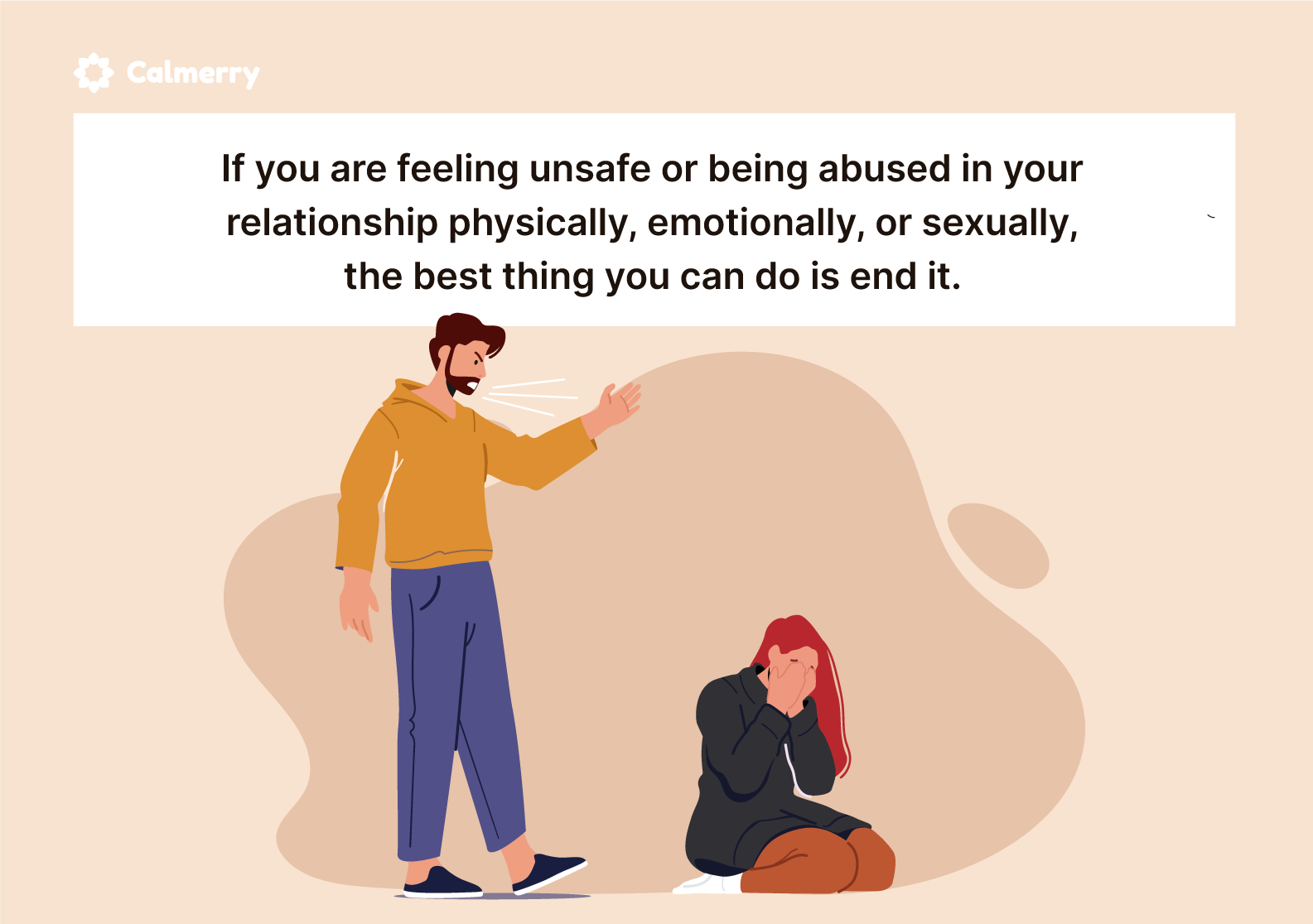
Ending a significant relationship is not easy. It may be difficult to leave when you have invested so much, are still hoping that your situation will change, or just fear being alone, so you will need support from your family and friends. You should talk to someone you are comfortable with.
If you are in an abusive relationship, don’t be trapped by guilt, confusion, or self-blame. You are not to blame for staying in an abusive relationship or not recognizing the abuse soon enough. Although it might take you some time to get over your feelings, you shouldn’t give up on yourself. You have the right to end a relationship that is not healthy for you. Living in an abusive relationship can lead to CPTSD.
Remember, it’s your life, and you deserve to be happy. You are worth it, and in the future, you can find a healthy relationship based on love and mutual respect.
How to build a healthier relationship
If you notice several red flags, counseling may be a good step. But sometimes, healthy relationships can also use a little extra work. You should remember that romantic relationships require ongoing commitment and attention for love to flourish.
And identifying and solving a small problem can often help prevent it from growing into a much bigger one down the road. Here are some steps you can take together with your partner to make your relationship stronger.
Communicate to solve conflicts
Good communication is crucial for building and maintaining a healthy long-term relationship. A positive emotional connection with your romantic partner makes you feel happy and safe. And as long as you communicate well together, you can manage to work through most problems you are facing.
And poor communication can cause serious problems in relationships and may even lead to divorce.
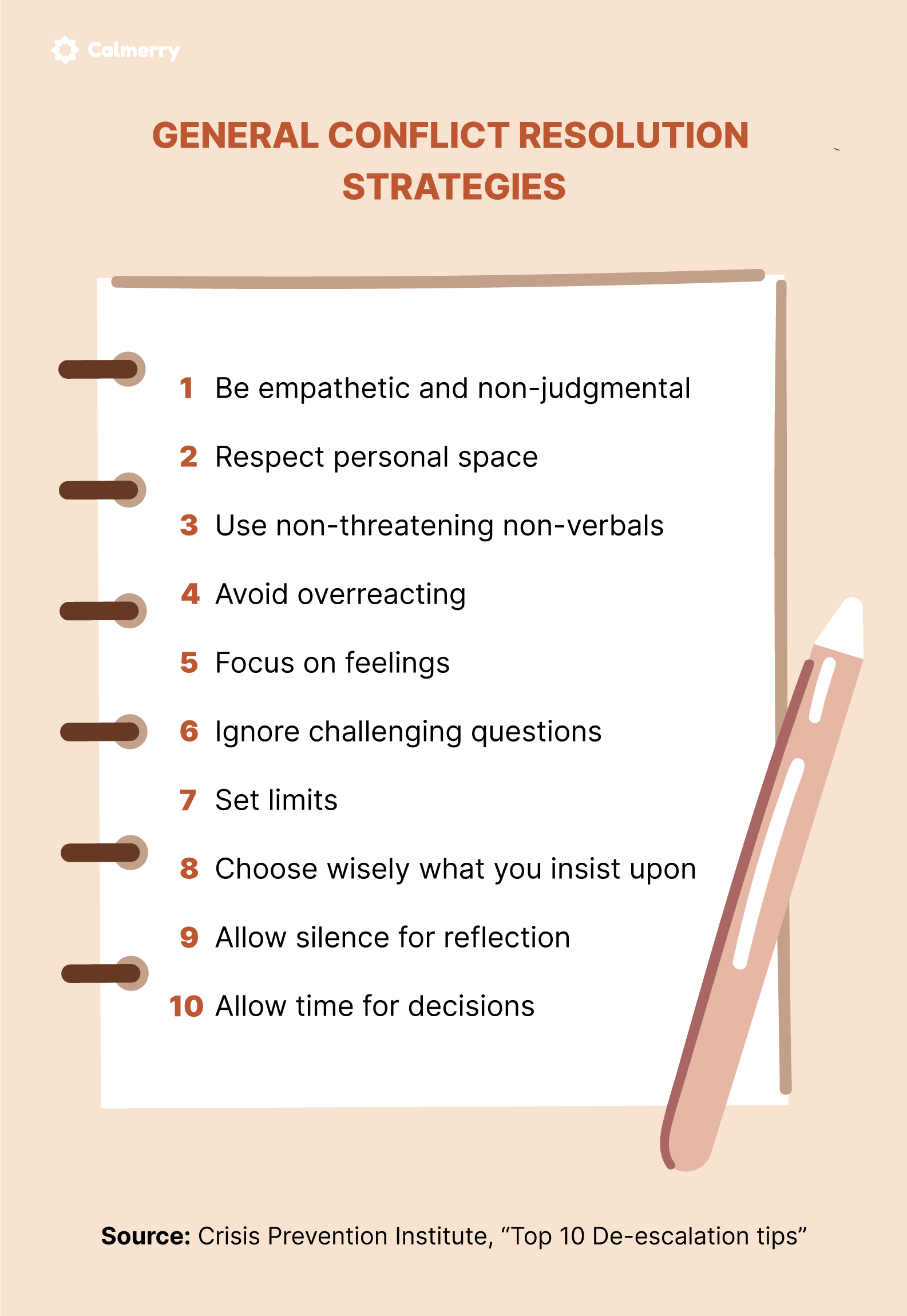
Conflicts in romantic relationships can arise for different reasons, for example, distribution of responsibilities (that often happens when one of the partners has ADHD), financial difficulties, jealousy, and parenting styles. Managing and resolving conflict is difficult and stressful. But if left unresolved, conflicts and stress associated with them may put even the most satisfying relationship at risk.
Besides, it’s unhealthy to suppress your negative emotions and feelings, such as anger and resentment. According to research, couples often die younger when partners have different styles of coping with anger. The risk of early death for both partners is bigger when a mismatch is more severe.
When it comes to solving conflicts in an intimate relationship, open and constructive communication is essential. First, you and your partner should evaluate the situation to decide how best to address it.
If it’s a serious issue, both partners should express their opposing views and then negotiate what changes should be made. But if it’s a disagreement about minor issues or issues that are outside your control, it may be more helpful that both of you acknowledge the problem and express mutual validation and forgiveness.
Spend quality time together
Every couple needs to spend quality time together for the relationship to stay healthy and strong. And for women, this aspect is more important than for men. Still, it can be rather challenging for many couples because the demands of work and other obligations can leave you little time to do something enjoyable with your partner.
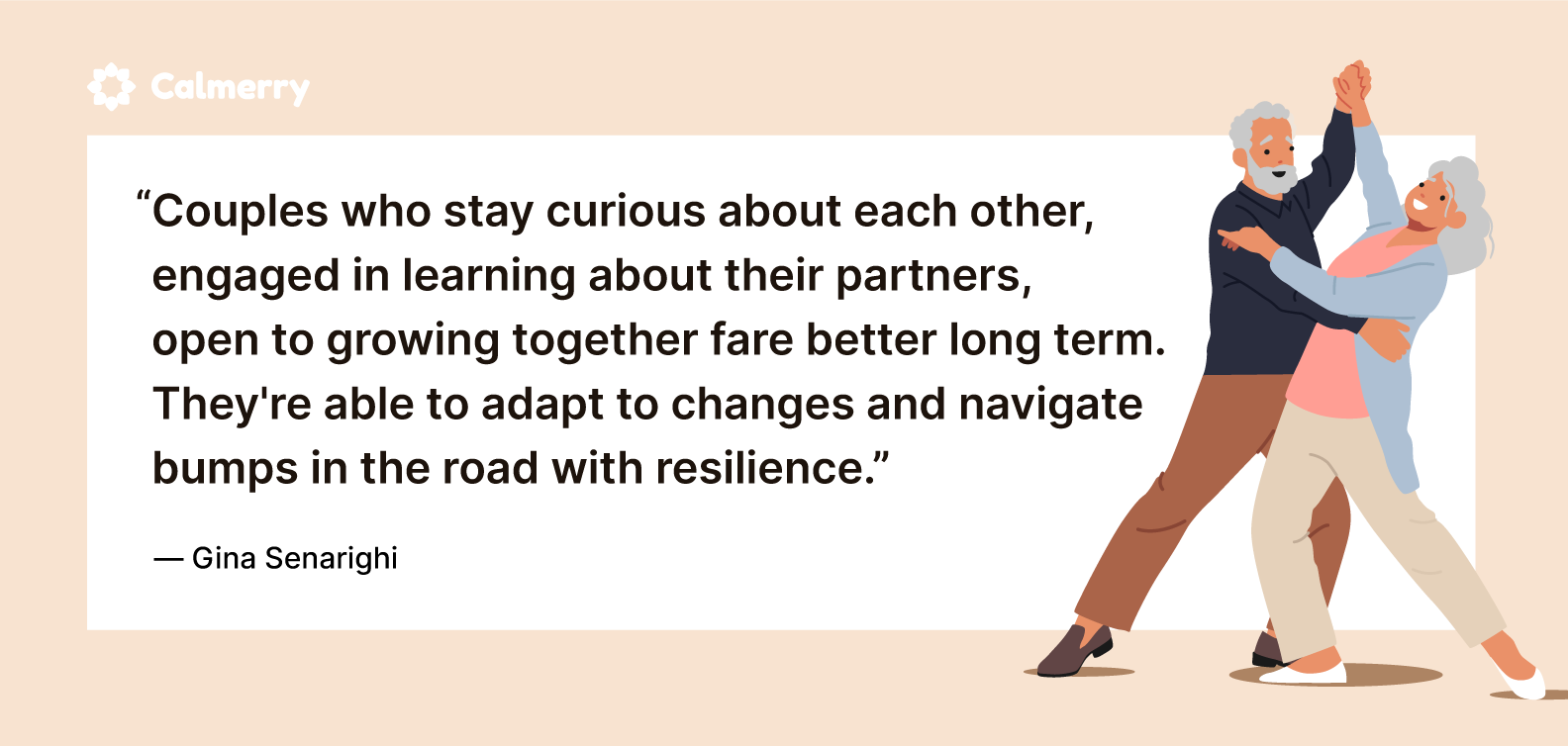
But if there is not enough face-to-face communication, you may become more distanced and disconnected as a couple. We all need emotional cues to feel loved, and they can only be conveyed in person.
That’s why you should actively choose to make time for each other, no matter how busy you are. You should both agree to put aside your phones and other electronics and stop thinking about other things and really focus on communicating with each other in the present moment.
According to the study by Gottman Research Institute, successful couples whose marriages continue to improve over time devote extra 6 hours per week to their relationship. This time should be spent meaningfully and mindfully to show your appreciation and affection for one another.
Here are some quick and easy ideas of things you can do together that will help increase connection and intimacy:
- Have a regular date night
- Cook meals together
- Go on a weekend getaway
- Use games involving “getting-to-know-you questions”
- Try to do something new together
- Get some exercise
- Read a good book together and discuss it
Show appreciation and attention
Appreciation is an important aspect of healthy relationships because, as human beings, we all crave positive attention. That’s why showing gratitude can be life-changing for your romantic relationship. Multiple studies reveal that partners who feel gratitude for one another typically feel closer to one another and are more satisfied with their relationships.
And one of the main reasons why long-term couples split up is that one of the partners didn’t show enough affection and attention to the other.

It’s important to show your appreciation and love to your partner every day, and you should do it in the ways that mean the most to them. You should find out your partner’s love language and base your actions around it to acknowledge that they really matter to you.
Here are some meaningful ways to show appreciation to your partner:
- Say “thank you” even for things you expect
- Compliment them on simple things
- Do something for your partner for no reason at all
- Always make eye contact when your partner speaks with you
- Praise them for their career successes publicly by posting on Facebook
- Give them a day off from responsibilities
Give each other space
Spending time together is as important as spending time apart. Every relationship requires growth together and also the personal growth of both partners. Each of you has your own personal goals, interests, preferences, aspirations, and desires, and each of you needs personal space.
Personal space means that you have time to put yourself first and take care of yourself. You do things you enjoy – something that makes you feel great about yourself. That allows you to be in a better mindset and take care of your relationship.
Having enough space or privacy in a relationship is very important for a couple’s happiness. That’s why good relationships are all about finding a healthy balance between two cycles of closeness and distance.
When you have some time apart, it keeps freshness in your relationship. It encourages each romantic partner to maintain their own sense of identity while still being a couple.
How much space is normal? There are no hard and fast rules about the exact amount of time you should spend alone. It depends on the attachment style. Some people may need more space than others, and you should respect that space to make your romantic relationship work.
Bottom line
Since all relationships are made of different behaviors, no relationship is perfect all the time. Relationships exist on a spectrum, and it may not be easy to tell when a certain behavior crosses the line from healthy to unhealthy.
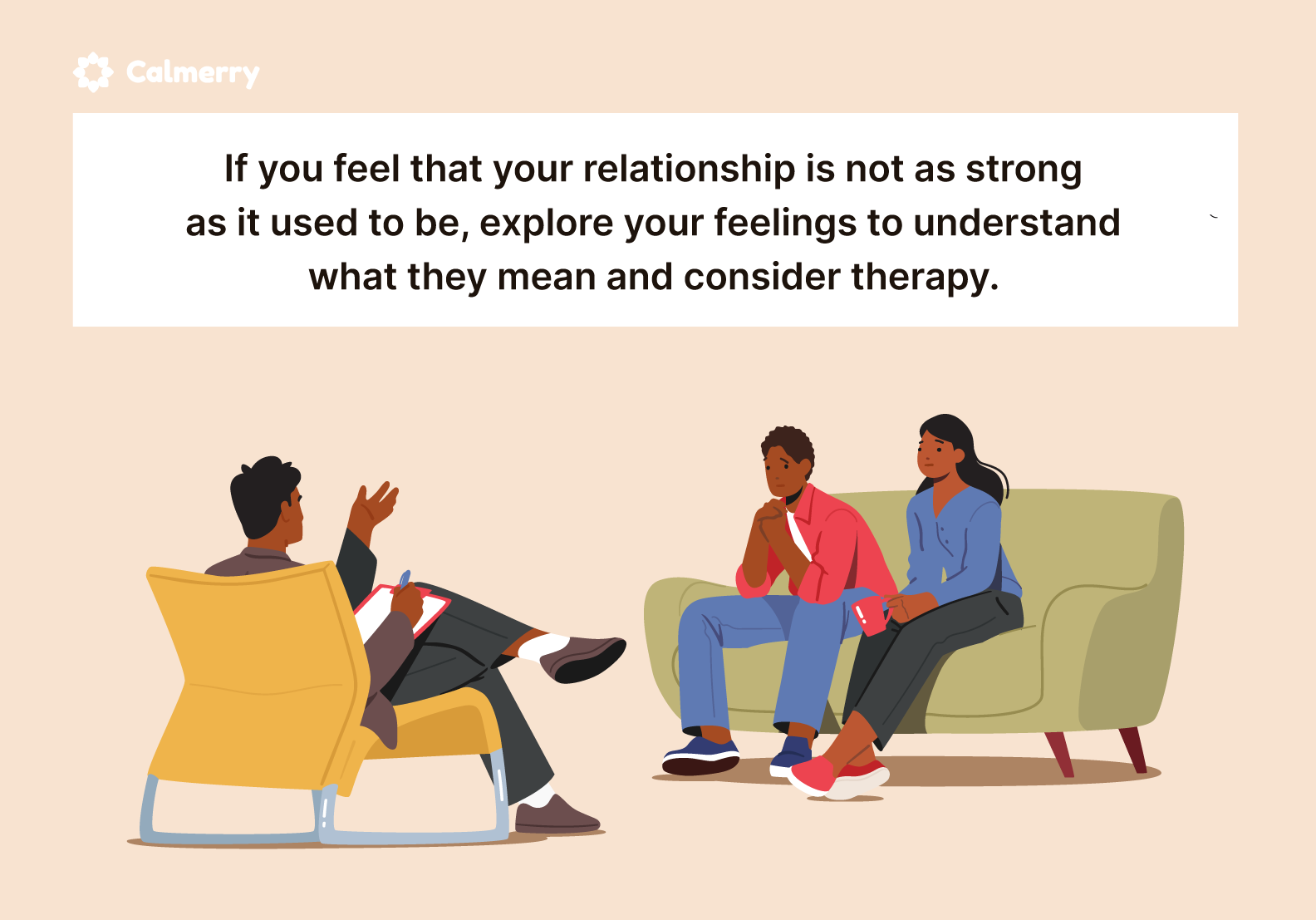
Each relationship has ups and downs, every partnership is unique, and there are always things you can work on. But strong, healthy relationships are typically grounded in some core characteristics like open communication, equality, respect, safety, trust, and honesty, and when they are missing, it’s important to address the problem.
If you feel that your relationship is not as strong as it used to be, explore your feelings to understand what they mean and consider therapy. Licensed therapists from Calmerry can help you get a better idea of the underlying causes of your problems and find a way through any difficulties.
Our therapists can help no matter what situation you face in your relationship. They can provide you with guidance on whether you should work to build a more fulfilling relationship or consider ending a relationship if it is ultimately unhealthy.
online therapy
live video session
